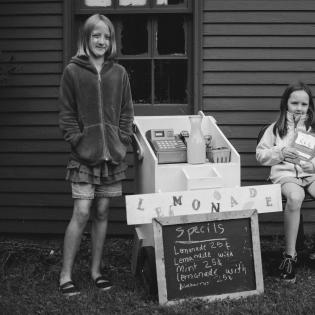What's the Big Idea?
The group discusses and agrees on a need to address through donating money. They watch a film about a boy who sets up a lemonade stand and read a book about a national Lemonade Stand effort. Then they identify a need, learn more, and communicate the need to others.
- Determine motivations to give that put others above self
- Come to an agreement on a fundraiser
- Video "If God Gives You Lemons" by Gregory Siers
- video of a reading of Alex and the Amazing Lemonade Stand by Liz Scott, Alex Scott and Jay Scott
Scott, Jay, Liz Scott and Alex Scott. Alex and the Amazing Lemonade Stand. Paje Publishing Co., 2004. ISBN: 0975320009.
Siers, Gregory. If God Gives You Lemons. Introspect Pictures, 1998.
Instructions
Anticipatory Set
As a refresher of the past two lessons, recall the definition of philanthropist, and focus on "giving treasure" as a way to give generously. Ask if there acts of philanthropy they discussed with their families that involved donations of money. Listen for areas of passion, such as cancer, environmental causes, the arts, or poverty in the community.
Introduce the 10-minute video, If God Gives You Lemons. This is a video about a boy who really wanted a bike. He decided to sell lemonade in the big city. What happens there will surprise him ... and you.
Note: While this film doesn't have the best sound quality, the message is worth the viewing. The making of the video is a student project, an example of his philanthropy to share time and talent to promote good will.
Watch the video, stopping to check for understanding a couple times. Talk about the setting, the characters and the problems in the video. Note when the boy is being a philanthropist by sharing his lemonade, and why he makes that choice. Discuss the following questions:
- Did it look like the boy had enough money to buy his bike?
- Will he be able to buy his bike after his act of philanthropy? (He put all his money in the pocket of a man who is homeless.)
- How do you think that made him feel?
- Why wouldn’t he be sad that he couldn’t buy his bike?
Introduce the story, Alex and the Amazing Lemonade Stand. Look at the Alex's Lemonade Stand website that tells the story of Alexandra Scott. She was a young girl who was fighting a battle with cancer and was able to raise money to help her parents pay for her treatments as well as pay for cancer research. She reached a goal of $1 million dollars before she passed away in the summer of 2004.
Note: There are some online readings of the book, including one introduced by her mom and read by kids with cancer in their families.
Make a suggestion that the group set up their own lemonade stand to raise money for a local need. Discuss what they could they raise money for. Recall some of their passions from the earlier discussion.
Through discussion and facilitator research, come to an agreement to set up a lemonade stand and raise money for a specific cause. The following lessons include the planning, advertising, and implementation details.
Philanthropy Framework
-
Strand PHIL.I Definitions of Philanthropy
-
Standard DP 01. Define Philanthropy
-
Benchmark E.1 Define philanthropy as the giving and sharing of time, talent, or treasure intended for the common good.
-
Benchmark E.4 Define and give examples of selfishness and selflessness.
-
-
-
Strand PHIL.II Philanthropy and Civil Society
-
Standard PCS 01. Self, citizenship, and society
-
Benchmark E.5 Identify one local citizen who has helped the community through giving and/or service.
-
-
